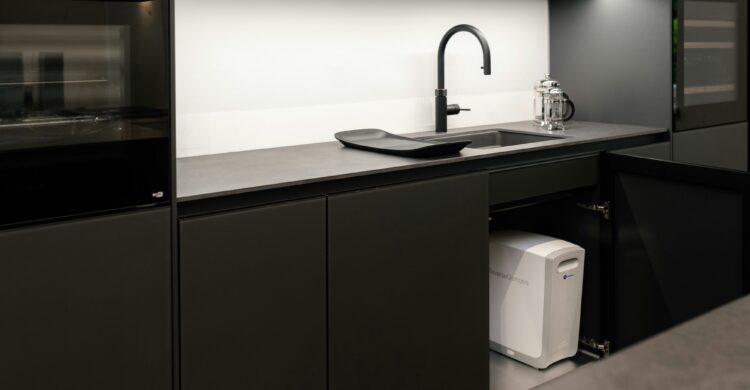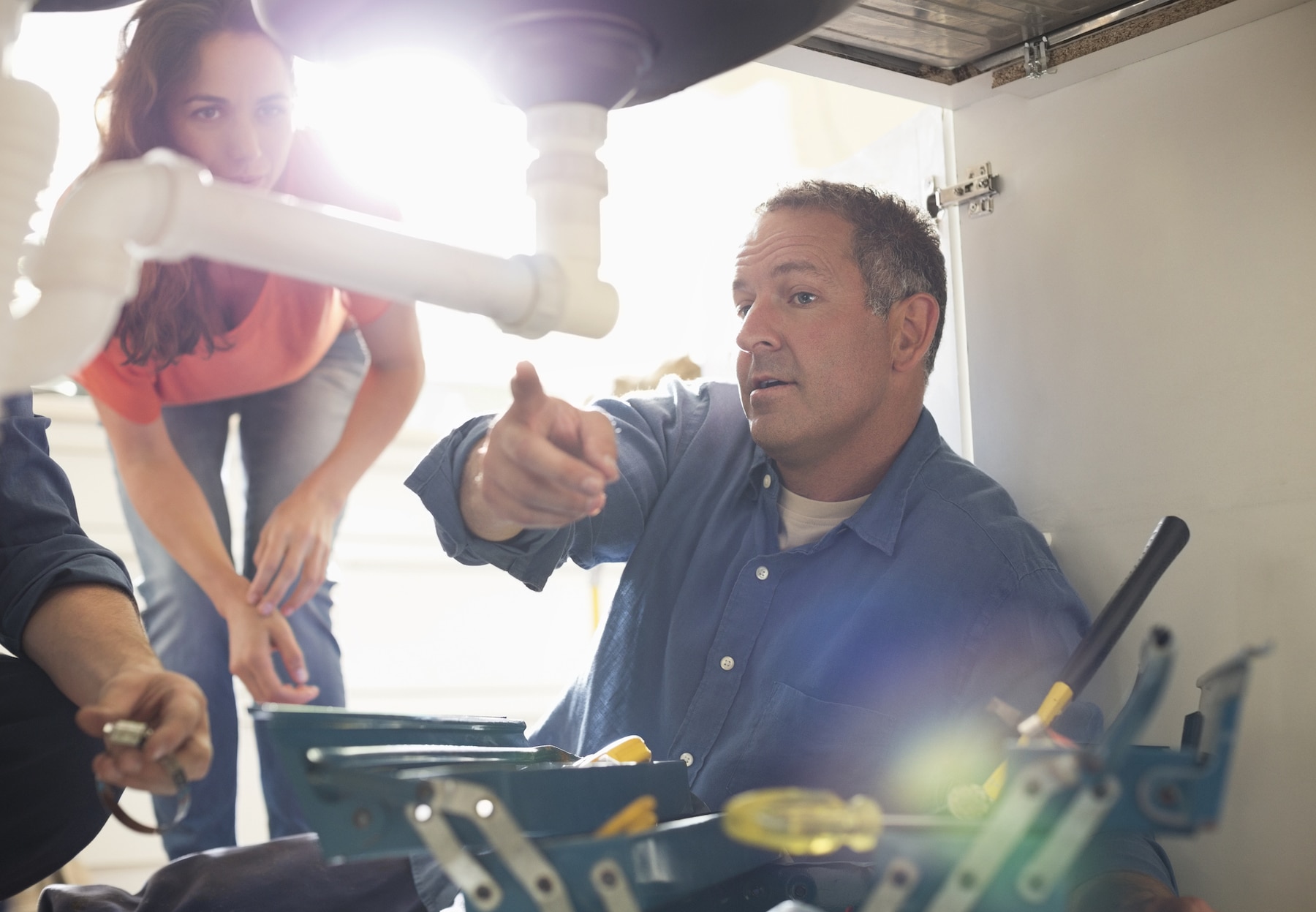
How to Choose the Best Water Filtration System for Your Home in 2025
Why You Should Filter Your Water
You probably already know filtered water tastes better, but are you aware of the potential health benefits? Tap water, even when meeting regulatory standards, can harbor impurities you don’t want to ingest.
Your water journeys a long way to reach your tap, passing through aging pipes and potentially accumulating contaminants along the way. This can include:
- Chlorine: Used for bacterial disinfection, it impacts your water’s taste and smell.
- Lead: A serious health risk, especially for children. Exposure, even at low levels, has lasting health effects.
- Pesticides: Agricultural chemicals like these can leach into water supplies.
- PFAS (Per- and polyfluoroalkyl substances): Dubbed “forever chemicals,” these contaminants are pervasive in drinking water sources nationwide, according to a 2023 study by the Environmental Working Group.
This might sound alarming, but it emphasizes why a good water filter is crucial. It acts as your final defense against these impurities, providing clean and trustworthy water.
Understanding Your Water – The First Step in How to Choose the Best Water Filtration System for Your Home
Before exploring different filter types, it’s essential to investigate what’s actually present in your water. The answer hinges on your location and your plumbing’s condition.
Public Water vs. Private Well
- Public water: You receive an annual water quality report (also known as a consumer confidence report), providing details on detected contaminants and their levels. You can often find these reports online for larger water systems (serving 100,000 people or more) via the EPA’s website.
- Private well: If you have a private well, you’re responsible for water testing. This involves engaging a certified lab, and the EPA provides a list of certified labs for this purpose.
Home Water Testing
Even with public water, home water testing provides extra insight into your water quality, especially with older plumbing. These kits, available online or at home improvement stores, generally assess common parameters like hardness, chlorine, pH levels, and lead.
Types of Water Filtration Systems
Armed with an understanding of your water, it’s time to delve into different filtration systems, considering their pros and cons. Matching the right system to your needs and water conditions is key.
1. Whole-House Water Filters:
As the name suggests, these systems treat all water entering your house, safeguarding your drinking water, showers, appliances, and plumbing.
Pros:
- Provides comprehensive protection across all water uses.
- Often improves water pressure and taste throughout the entire house.
- Reduces scale accumulation in appliances and pipes, prolonging their lifespan.
Cons:
- Higher upfront cost compared to other options.
- Frequently necessitates professional installation.
When They’re a Good Choice:
- If you’re dealing with specific issues, like hard water or excessive chlorine, affecting your entire house.
- You desire hassle-free, comprehensive filtration without needing separate filters for different purposes.
- You have older plumbing and aim to minimize potential contaminants.
Whole-House Filter Options
For those leaning towards whole-house filtration, these options excel:
- 3M Aqua-Pure Whole House Water Filter: This is a solid choice balancing affordability, effectiveness, and ease of use.
- GE Whole House Water Filtration System: This system prioritizes value, providing straightforward whole-home filtration without breaking the bank.
2. Under-Sink Water Filters
These filters connect directly to your cold water line under the sink, dispensing filtered water right from your faucet.
Pros:
- Dedicated filtered water supply for drinking and cooking.
- Often offer more advanced filtration compared to filter pitchers.
- Discreetly installed out of sight, under your sink.
Cons:
- Might require professional plumbing expertise for installation.
- You could need a separate, dedicated faucet for filtered water.
When They’re a Good Choice:
- You desire filtered water readily available in your kitchen without sacrificing counter space.
- You require a larger filtered water capacity than a pitcher offers.
- You prefer a discreet and unobtrusive filtration setup.
Top-Rated Under-Sink Filters
If you’re ready to go with an under-sink installation, this model stands out for its superior filtration performance:
- Clearly Filtered Under-Sink Filter: This filter tackles a wide range of contaminants (over 232.), ensuring cleaner and healthier water for drinking.
3. Countertop Water Filters:
Striking a balance between convenience and functionality, countertop filters require no complex installation, simply resting on your counter and connecting to your faucet.
Pros:
- No installation is necessary – plug and play.
- Easily portable – a fantastic option for renters.
- Filters larger water volumes compared to filter pitchers, reducing refill frequency.
Cons:
- Occupies valuable counter space.
- Filters might require more frequent replacement than other options, depending on their capacity.
When They’re a Good Choice:
- If you’re renting and can’t make permanent plumbing alterations.
- You seek filtered water without the commitment of a permanently installed fixture.
Choosing the Right Countertop Model:
- Carefully assess your filtration needs, desired capacity, and aesthetics to find the perfect match.
4. Water Filter Pitchers:
This classic, economical option provides a straightforward way to filter your drinking water.
Pros:
- Budget-friendly.
- Effortless – no installation required.
- Easy to store in your fridge for chilled, filtered water on demand.
Cons:
- Limited capacity – frequent refills are a necessity.
- Contaminant removal capabilities are generally less comprehensive compared to other filtration systems.
- Requires periodic filter replacements.
When They’re a Good Choice:
- If you live alone or in a small household (1-2 people).
- You’re seeking a simple, low-cost filtration method.
- Improving the taste of your drinking water is your primary goal.
High-Quality Pitcher Option:
- Clearly Filtered Water Pitcher: This option effectively eliminates a broad spectrum of contaminants, ensuring cleaner, tastier water.
Factors to Consider: Narrowing Down Your Choices
With a filter type in mind, let’s refine your selection further by evaluating these important factors.
1. Contaminants: Know What You’re Dealing With
It’s time to revisit that water quality report or test. Look for certifications on filter packaging or descriptions that explicitly state the contaminants a specific filter removes. Many filters are certified by the National Sanitation Foundation (NSF), indicating they adhere to rigorous standards.
2. Flow Rate: Avoiding the Dreaded Trickle
Imagine installing a new filter, excited for crisp, clean water—only to turn on the tap and get a disappointing trickle. That’s why flow rate, or the amount of water a filter processes each minute, is so important. For whole-house and under-sink systems especially, choosing a filter with a strong flow rate ensures you maintain good water pressure throughout your home.
3. Filter Lifespan: Planning for Replacements
Filters don’t last forever. They have a defined lifespan, measured by the gallons of water they can purify before needing replacement. Longer-lasting filters mean less frequent replacements and lower long-term costs. Don’t forget to factor in filter replacement costs when budgeting for your water filtration system.
4. Maintenance: Keeping it Running Smoothly
Filters, just like other household appliances, require upkeep. Opt for systems that are easy to maintain—simple filter changes, clear indicators for replacement time, and readily available replacement filters will simplify the process.
Conclusion
You’ve done it. You’re now well-prepared to select the best water filtration system for your home and budget. By carefully considering your water source, understanding different filter types, and aligning your priorities, you’ll discover the perfect system for cleaner, healthier, and better-tasting water right from your tap.
FAQs about How to Choose the Best Water Filtration System for Your Home
How to Choose a Whole House Water Filtration System?
Selecting a whole house system begins with a clear picture of your water quality (get it tested if you haven’t already.) and your priorities:
- Contaminants: What are the specific concerns in your area? Do you have hard water, excessive chlorine, or other impurities to address?
- Flow Rate: Does the system you’re considering have a sufficient flow rate to handle your household’s water usage without compromising water pressure?
- Budget: Whole-house systems represent an investment. Determine a realistic budget that aligns with your long-term needs.
How Do I Choose a Good Water Filter for My House?
When making this important decision, consider these key aspects:
- Your Water Type (Public vs. Well): Are you connected to a public water supply or do you rely on a private well? Check water quality reports for public systems or arrange for well water testing.
- Filtration Needs: What are the specific contaminants you need to remove? Are you concerned about lead, chlorine, pesticides, or other impurities?
- Household Size/Usage: A larger family will likely need a system with a higher capacity than a single person or a couple. Factor in your daily water usage habits.
- Budget: Water filters come in a range of prices. Set a budget that accommodates both the initial cost of the system and ongoing filter replacement expenses.
How Do I Figure Out What Water Filter I Need?
Follow these steps for a more structured approach:
- Check Your Water Quality: The first and most important step—get a clear understanding of the quality of your water. If you’re on a public system, consult your annual water report. If you have a well, arrange for a comprehensive test.
- Define Your Needs: What are your primary goals for filtration? Are you aiming for better-tasting water, lead removal, or addressing other specific contaminants?
- Evaluate Your Lifestyle: Think about your available space, budget, and desired maintenance level. Are you comfortable with frequent filter changes (like those needed for a pitcher) or do you prefer a more set-it-and-forget-it approach (whole-house system)?
What is the Difference Between a Water Purifier and a Water Filtration System?
While these terms are often used interchangeably, there’s a distinction:
- Water Filtration: Filtration systems are primarily designed to remove larger particles, sediment, chlorine, and improve the taste and odor of your water.
- Water Purification: Purification goes a step further, targeting microscopic contaminants such as viruses, bacteria, and dissolved solids. Purification methods often include reverse osmosis, UV treatment, or distillation.
Finding the Best Water Filtration System for Your Home
Choosing the right water filtration system might seem complicated at first, but with the right knowledge, and a little professional help, you can enjoy cleaner, safer water for years to come. Whether you’re looking for a whole-house system, an under-sink filter, or simply better-tasting water from a countertop unit, understanding your water quality and your household needs is the key to making the best choice.
If you need expert guidance or professional installation, the licensed plumbers at Conditioned Air Systems are here to help. From selecting the right system to ensuring it’s installed properly, their team makes the process easy, giving you complete confidence in your home’s water quality.

